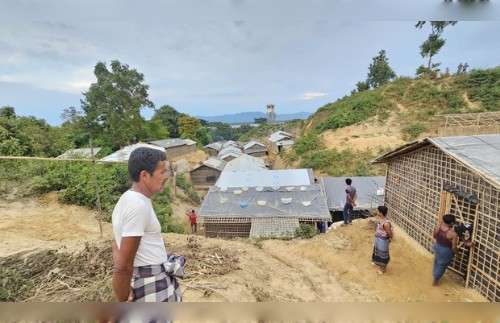A Bangladesh court on Thursday sentenced 16 people to death for their roles in the killing of a student who was doused with kerosene and burned after reporting to police that her madrassa principal had sexually assaulted her.

The court in Feni district, about 161 km (100 miles) from Dhaka, sentenced principal and attack mastermind Siraj Ud Doula, and 15 others in the April killing of Nusrat Jahan Rafi, 18, a student at the Sonagazi Islamia Senior Fazil Madrassa.
Judge Mamunur Rashid pronounced the verdicts to a packed courtroom, Feni district public prosecutor Hafez Ahmed told journalists.
“The court has awarded death penalty for 16 people, including Sonagazi Islamia Senior Fazil Madrasa Principal Siraj Ud Doula,” Ahmed said.
“We are happy with this historic verdict,” he said. “The court has signaled that the death of Nusrat will not be forgotten.”
Five of the defendants were Doula’s students who lured Nusrat to the roof of a nearby building before setting her ablaze.
Motahar Hossain, who was in the courtroom, told BenarNews many of the defendants broke down as they were sentenced and some yelled at Doula.
Nusrat’s father spoke to reporters after hearing the sentencings.
“We are happy with this verdict. We want early implementation of the verdict,” Rafi’s father, AKM Musa Manik, said. “We do not want this brutality to happen again.”
Nusrat’s death shocked the Muslim-majority nation, provoking protests and spotlighting sexual crimes against women and children.
Violence against women, considering the number and gravity of atrocities, has now reached “a level which is unimaginable,” Transparency International Bangladesh (TIB) said following her killing.
New York-based Human Rights Watch said Nusrat’s death highlighted the need for officials to take complaints from survivors of sexual assaults seriously.
The defendants said they would appeal before the High Court. The Bangladesh justice system allows appeals to the High Court and, if it upholds the sentencing, to the Appellate Division of the Supreme Court.
Appeals must be exhausted before an execution can occur. Bangladesh prisons house about 1,700 death row inmates, according to home ministry figures.
Attack details
On April 6, a group of students led Nusrat to the roof of a building next to the madrassa by telling her one of her friends was being beaten. As she reached the roof, five assailants clad in black veils tried to get her to sign a paper calling for the assault charges against the principal to be dropped.
When Nusrat refused, they bound her, doused her with kerosene and set her ablaze. She managed to leave the building but had suffered burns to 80 percent of her body.
While being transported to a hospital, Nusrat named her attackers, according to her brother who recorded her statement.
Days earlier on March 27, Nusrat’s mother filed a case against Doula at the Sonagazi police station in Feni after he allegedly called Nusrat to his office and sexually assaulted her. Police arrested Doula and he was sent to jail.
The police charge-sheet said that while Doula was behind bars, he instructed his accomplices to force Nusrat to drop the case or kill her while making it appear she committed suicide.
Prime Minister Sheikh Hasina ordered Nusrat be given the best care and transferred to Singapore for specialized treatment, but Nusrat was not able to travel and died from her burn injuries on April 10.
Hasina demanded the justice system take swift action against the killers.
Sentences supported
The executive director of rights body Ain-O-Shalish Kendra praised the court for its handling of the case.
“This verdict is satisfactory. We hope this punishment would be upheld in the High Court and Supreme Court,” Sheepa Hafiza told BenarNews. “We want to see quick execution following exhaustion of the legal procedures.”
Salma Ali, chief of Bangladesh National Women Lawyers’ Association, praised the court for its speedy trial, as required under the women and children repression prevention act, which stipulates that such cases must be concluded in six months.
“We are happy that the trial court handed out the judgment in 61 working days,” she told BenarNews. “The whole country had been monitoring the case. We hope this verdict will stand in the final judgment.”
Copyright ©2015,BenarNews. Used with the permission of BenarNews https://www.benarnews.org
China Approves Construction of Mega-Dam in Tibet
Almost 65,000 Rohingya Have Entered Bangladesh Since Late 2023,Govt Says
Presenting Latest Military Simulators by Ukraine Tech Company SKIFTECH
Year in Pictures: Momentous Political Upheaval,Grim Anniversaries –and Leaving Past Behind
From the Massive 2004 Earthquake and Tsunami,Survivors and Advocates Reflect on Lessons
Ukraine Reveals Handwritten Letter of a Fallen North Korean Soldier in Kursk
Syrians Are Not So Sure for Going Home
Golan Heights Druze Welcome New Syrian Rulers
If you want to contact us
Subscribe our latest updates
Subscribe our You Tube Channel














